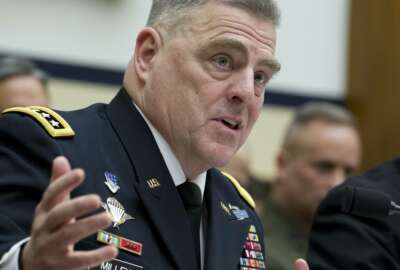
$37.4B Army contract exceeds 250 awards in phase 2
The Army added almost 200 more vendors to its RS3 contract, a C4ISR vehicle that is replacing the R2-3G contract.
A second round of awards for the Army’s $34.7B RS3 contract — a Command, Control, Communications, Computers, Intelligence, Surveillance and Reconnaissance (C4ISR) services vehicle — brought the number of awardees up to 253 last week. Awardees can compete to provide services for acquisition and strategic planning; education and training; engineering; logistics; and research, development, test and evaluation to the DoD.

The first round of awards happened in May 2017, when 55 contractors were chosen from among 387 solicited bids. The Army announced 198 more awardees on October 18. The initial solicitation said that a second phase could occur if there were fewer than 25 large businesses in the first award.
“Given the expanded scope of the C4ISR requirements here, and to ensure that there is a robust competition at the task order level when the real work comes in, I think they concluded it was wise to expand the number of contract holders, both on the small businesses as well as the other than smalls. It’s not unusual to go through several rounds of awards,” Alan Chvotkin, executive vice president and counsel of the Professional Services Council, said in an interview.
RS3 is a five-year, multiple award indefinite delivery, indefinite quantity (IDIQ) performance based contract. A five-year optional ordering period will follow the initial base ordering period, which ends in May 2022.
RS3 succeeds the Rapid Response — Third Generation (R2-3G) contract as a way for program managers to gain rapid access to contractors who provide the kind of services this contract covers. A number of large contractors, including Northrop Grumman, Raytheon, BAE Systems and Leidos, are carrying over from R2-3G to RS3. Army Contracting Command said the transition from R2-3G to RS3 will be seamless.
Chvotkin said the scope of the work and recent changes in technology, especially in the C4ISR world, necessitated the replacement of the R2-3G contract.
“The current contract expires in 2019, so RS3 is a planned replacement,” Chvotkin said. “They’ll make new awards from it and continue to make some awards under the old phase. But as we saw with this version, it’s useful to have onramps as the marketplace changes, and the technology changes. So in part to its credit, and part to its fear, I guess, we’re going to see the Army has already announced that there’s going to be two new rounds of on-ramps for vendors who aren’t part of this current tranche of awardees.”
Those on-ramps will occur in the third and sixth years of the contract, Chvotkin said.
Services provided under the RS3 contract include:
- acquisition planning
- HR support
- risk Management Support
- various types of training
- augmented/Virtual Reality
- cloud
- data analytics
- cybersecurity
- supply chain management
- various other logistical functions
- artificial intelligence
- various other research functions
- prototyping
That’s just a noteworthy handful of nearly 100 different services listed on the Army Contracting Command’s official site for the contract.
The site notes that its list is not complete either.
Copyright © 2024 Federal News Network. All rights reserved. This website is not intended for users located within the European Economic Area.
Daisy Thornton is Federal News Network’s digital managing editor. In addition to her editing responsibilities, she covers federal management, workforce and technology issues. She is also the commentary editor; email her your letters to the editor and pitches for contributed bylines.
Follow @dthorntonWFED
Related Stories

Army says several cloud RFPs already in the works under new ACCENT contract




